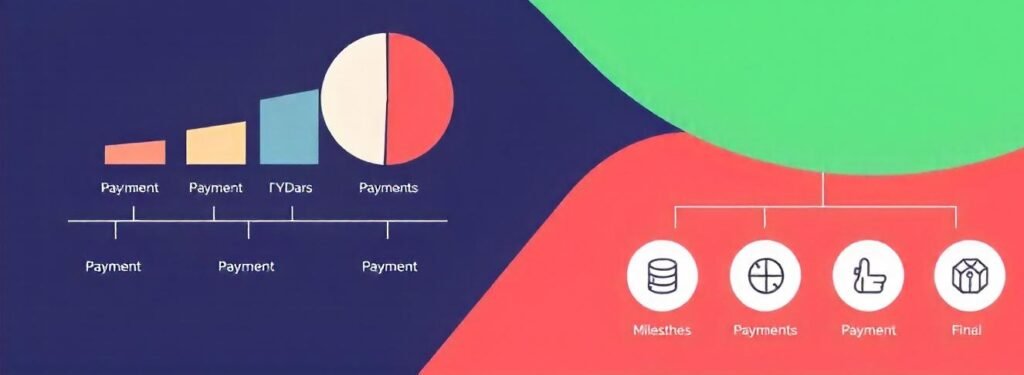Freelancing offers unparalleled freedom, but it also requires protecting your work and business. A strong freelance contract is essential; it defines your relationship with clients, ensures you get paid, and sets clear expectations. Whether you’re starting or are an experienced freelancer, knowing the key elements of a contract can prevent misunderstandings and legal issues.

Your success as a freelancer depends not just on your skills but also on having a solid freelance contract. This document is more than a formality; it’s the backbone of your business. Let’s explore how to craft a contract that secures your interests and sets the stage for long-term success.
1. The Pulse of Your Project: Defining the Scope
Every successful freelance contract starts with a clearly defined project scope. Specify deliverables, tasks, and deadlines to prevent scope creep and ensure both parties are aligned. Detailed descriptions help avoid misunderstandings and ensure you get paid for all the work you do.
Expanding the Scope of Work: Include specifics about the process, such as drafts and revisions. This helps manage expectations and values in every part of your work.
Handling Changes in Scope: Add a clause for changes to the project scope, including additional fees or extended deadlines, to handle any project evolution smoothly.
Understand why defining the project scope is crucial for success in Importance of a Freelance Contract: Why You Need One for Success.
2. Financial Flow: Structuring Payment Terms
Money is vital for your freelance business. A clear payment structure in your contract ensures smooth financial transactions. Detail payment schedules, methods, and amounts. Include terms for upfront deposits, milestones, and final payments.
Incorporating Payment Milestones: Break payments into milestones to manage cash flow and motivate both parties to stay on track. This reassures clients that they are paying for completed work.
Addressing Payment Methods and Currencies: Specify accepted payment methods and currencies, especially for international clients, to avoid complications.

Explore strategies to secure payments and build client relationships in Turning First-Time Clients into Long-Term Partners with Effective Retention Techniques.
3. Ownership & Rights: Protecting Your Intellectual Property
Your work is your intellectual property. Clearly outline who owns the rights in the contract. Will you retain ownership until payment, or does the client own the work from the start? This section protects your intellectual property and clarifies ownership.
Clarifying Usage Rights: Define how clients can use the work—whether for a specific project or multiple platforms. This affects pricing and scope.
Managing Licensing Agreements: If licensing work, include terms specifying the duration and extent of the license to avoid disputes.
Learn more about protecting your intellectual property from the World Intellectual Property Organization.
4. Revision Cycles: Setting Boundaries for Edits
Revisions are a part of creative projects, but they can become endless without clear boundaries. Your contract should specify how many revisions are included and what constitutes a revision versus a new task. This helps protect your time and resources and sets clear expectations for clients.
Detailing Revision Policies: Include details about how revisions are handled, such as submission timelines and approval processes. This helps manage expectations and keeps the project on track.
Including a Feedback Loop: Establish a feedback loop to handle revisions efficiently and avoid last-minute changes that disrupt your schedule.
Learn how to manage revisions effectively with tips from Mastering Freelance Writer Time Management: Essential Tips and Strategies.
5. Confidentiality Clauses: Safeguarding Sensitive Information
Freelancers often handle sensitive information. A confidentiality clause ensures this information remains secure. Define what information is confidential, how it should be handled, and the duration of confidentiality. This builds trust and protects both parties.
Extending Confidentiality Beyond the Project: Extend confidentiality obligations beyond project completion if dealing with proprietary information or trade secrets.
Addressing Data Protection Regulations: Align confidentiality clauses with data protection regulations, like GDPR, to avoid legal issues.
For more on confidentiality agreements, see Rocket Lawyer.
6. Time Capsules: Milestones and Deadlines
Clear deadlines and milestones are crucial for keeping projects on track. Outline the project timeline, including key milestones and review periods. This alignment ensures both you and the client understand the project’s pace and reduces delays and misunderstandings.
Including Buffer Times: Add buffer times for unexpected delays or additional revisions. This helps manage your schedule and prevents missed deadlines.
Aligning Milestones with Payment Terms: Align milestones with payment terms to create a consistent workflow and prevent financial disruptions.
For strategies on managing freelance timelines, see Essential Strategies for Building a Strong Freelance Career.

7. The Safety Net: Termination & Dispute Resolution
Not all projects go as planned. A termination clause provides a safety net, outlining conditions for ending the agreement. Pair this with a dispute resolution process to handle conflicts amicably, ensuring a smooth exit if necessary.
Specifying Grounds for Termination: Define grounds for termination, such as non-payment or breach of contract, to avoid ambiguities.
Establishing a Dispute Resolution Process: Include a process for resolving disputes, such as mediation or arbitration, to minimize conflicts.
Navigate freelance relationship dynamics with Navigating the Shift: Transitioning to Freelancing with Confidence.
8. Indemnity Clauses: Shielding Against Risks
An indemnity clause protects against unforeseen risks. It ensures you’re not liable for issues beyond your control during or after the project. This clause is crucial for industries with high legal risks.
Customizing Indemnity Clauses: Tailor indemnity clauses to specific industry risks, ensuring you’re protected without being overly restrictive.
Balancing Risk and Responsibility: Balance risk and responsibility between you and the client to avoid disputes.
For more on indemnity clauses, consult LegalZoom’s Guide to Contracts.
9. Force Majeure: Planning for the Unexpected
Life’s unpredictability means you need a force majeure clause to cover unforeseen events like natural disasters or illness. This clause outlines how such situations are handled and their impact on the project.
Defining Force Majeure Events: Clearly define force majeure events to avoid confusion or disputes.
Outlining Responsibilities During Force Majeure: Specify how work will be managed or rescheduled during force majeure events to keep the project on track.
Prepare for the unexpected with Adapting to Uncertainty in Freelancing: Preparing for the Unexpected.
10. Legal Considerations: Understanding the Fine Print
Understanding legal aspects is crucial for a contract that is enforceable and protects your interests. This includes knowing legal language, jurisdiction, and any specific regulations. Familiarize yourself with these aspects to ensure your contract stands up in court.
Learning Legal Language: Learn common legal terms to understand your rights and obligations.
Choosing the Right Jurisdiction: Specify the jurisdiction for any legal disputes to clarify where they will be resolved.
Enhance your legal understanding with insights from Lawyers.com.
Conclusion: Crafting Contracts for Freelance Success
Mastering freelance contracts is essential for a successful freelancing career. Address key elements such as scope, payments, ownership, revisions, and legal considerations. A strong contract protects your interests and fosters a professional-client relationship. Use well-crafted contracts to enhance your freelancing journey and achieve your career goals.
Ready to take control of your freelance career with effective contracts? Start by creating a template that fits your unique needs. For more tips on freelance success, visit Freelance Success Tips.